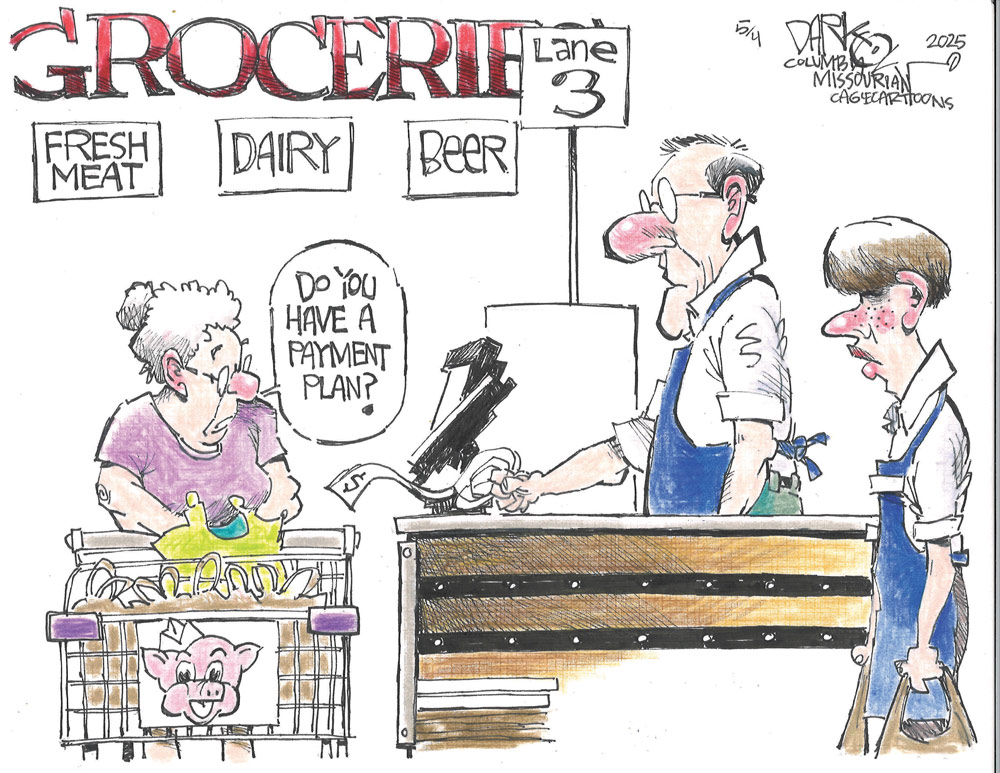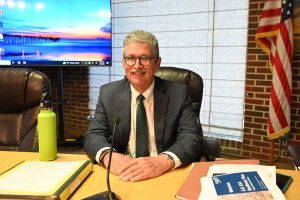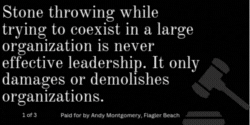
To include your event in the Briefing and Live Calendar, please fill out this form.
Weather: Mostly sunny. A slight chance of showers in the morning, then a chance of showers with a slight chance of thunderstorms in the afternoon. Highs around 90. South winds 5 to 10 mph. Chance of rain 30 percent. Tuesday Night: Partly cloudy. A chance of showers with a slight chance of thunderstorms in the evening. Lows in the upper 60s. Southeast winds 5 to 10 mph. Chance of rain 30 percent.
- Daily weather briefing from the National Weather Service in Jacksonville here.
- Drought conditions here. (What is the Keetch-Byram drought index?).
- Check today’s tides in Daytona Beach (a few minutes off from Flagler Beach) here.
- Tropical cyclone activity here, and even more details here.
Today at a Glance:
5th District Court of Appeal Sits in Flagler: A three-judge panel of the Fifth District Court of Appeal, which hears appeals from Flagler County and 12 other counties, holds three cases in Courtroom 301 at the Flagler County courthouse starting at 9 a.m. The judges are the Hon. Brian D. Lambert, Presiding Judge, Eric J. Eisnaugle and John Maciver. The list of cases is accessible here. The session is open to the public.
The Palm Coast City Council meets at 6 p.m. at City Hall. For agendas, minutes, and audio access to the meetings, go here. For meeting agendas, audio and video, go here.
Flagler Beach’s Planning and Architectural Review Board meets at 5:30 p.m. at City Hall, 105 S 2nd Street. For agendas and minutes, go here.
The Bunnell Planning, Zoning and Appeals Board meets at 6 p.m. at the Government Services Building, 1769 East Moody Boulevard, Bunnell. The board consists of Carl Lilavois, Chair; Manuel Madaleno, Nealon Joseph, Gary Masten and Lyn Lafferty.
Random Acts of Insanity Standup Comedy, 8 p.m. at Cinematique Theater, 242 South Beach Street, Daytona Beach. General admission is $8.50. Every Tuesday and on the first Saturday of every month the Random Acts of Insanity Comedy Improv Troupe specializes in performing fast-paced improvised comedy.
The Flagler Beach Library Writers’ Club meets at 5 p.m. at the library, 315 South Seventh Street, Flagler Beach.
Notably: Seen from behind, it’s an ordinary airport scene: a weary man leaning against his bags, catching a nap. Except that you quickly realize he’s in a glass-encased box. You approach. You note that the box is sealed. You look at the man from the front. He is as real as your drunk uncle, down to skin spots, a droopy mustache, creases in his orange t-shirt as he sleeps, one ankle folded under his knee. It is “The Traveler,” Duane Hanson’s 1985 sculpture of–as the tag tells us–bronze polychromed in oil, mixed media with accessories. A Wikipedia page about Hanson tells us he was a South Florida artist (1925-1996) who modeled his hyper-realistic sculptures on real people, whom he’d photograph, cast in his preferred media, then paint. He sculpted sunbathers, tourists, unhoused people, and in 1966 a back alley abortion, which I could not find, and in 1967 “Accident,” the scene of a motorcycle crash he apparently sculpted the way J.G. Ballard wrote Crash. He dropped that polemical style in the 1970s. “The Traveler” is quite enticing even after the initial shock. He dozes, but he’s terribly alive. He interacts. He’s as interesting to look at as are the people who notice him and approach, trying to understand. It doesn’t take long. The sculpture isn’t intended to shock, but to make you pause, maybe envy the space The Traveler has carved out for himself, or make you project all you wish on his origins and destination: three bags? He has no ring, but he has that exhausted look of the divorced who takes his naps where he can. We saw him at Orlando Airport. A brief oasis of art in a jungle of degradation. We sat next to him, bracing ourselves before entering the maw of the TSA line, which would hold us hostage for exactly an hour. “The Traveler” dates from 1996, pre-TSA. When he awakens, Rip Van Winkle-like, he will stroke out at what he sees.
—P.T.
View this profile on Instagram
![]()
The Live Calendar is a compendium of local and regional political, civic and cultural events. You can input your own calendar events directly onto the site as you wish them to appear (pending approval of course). To include your event in the Live Calendar, please fill out this form.
July 2025
Flagler Beach Farmers Market
Coffee With Flagler Beach Commission Chair Scott Spradley
Grace Community Food Pantry on Education Way
Second Saturday Plant Sale at Washington Oaks Gardens State Park
American Association of University Women (AAUW) Meeting
Peps Art Walk Near Beachfront Grille
ESL Bible Studies for Intermediate and Advanced Students
Grace Community Food Pantry on Education Way
Palm Coast Farmers’ Market at European Village
Gamble Jam at Gamble Rogers Memorial State Recreation Area
Al-Anon Family Groups
For the full calendar, go here.

What did it matter where you lay once you were dead? In a dirty sump or in a marble tower on top of a high hill? You were dead, you were sleeping the big sleep, you were not bothered by things like that. Oil and water were the same as wind and air to you. You just slept the big sleep, not caring about the nastiness of how you died or where you fell. Me, I was part of the nastiness now.”
–From Raymond Chandler, The Big Sleep.









































Pogo says
@Unhoused
… yes, much better; no problem isn’t an opportunity for a fashionably sensitive euphemism.
Your call is important to God, please remain on the line.
Sherry says
I couldn’t have said it better myself. Regardless of who you voted for, take just a few minutes and really “THINK” about this. . .
Keep demonstrating against Trump — but also for a better future.
The importance of progressive populism
Robert Reich
May 6
Demonstrations against Trump are getting larger and louder. Fabulous. This is absolutely essential.
But at some point we’ll need to demonstrate not just against Trump but also for the America we want.
Trump’s regressive populism — cruel, tyrannical, bigoted, authoritarian — must be met by a bold progressive populism that strengthens democracy and shares the wealth.
We can’t simply return to the path we were on before Trump. Even then, big money was taking over our democracy and siphoning off most of the economy’s gains.
Two of America’s most respected political scientists — Professors Martin Gilens of Princeton and Benjamin Page of Northwestern University — analyzed 1,799 policy issues decided between 1981 and 2002. They found that “the preferences of the average American appear to have only a minuscule, near-zero, statistically non-significant impact upon public policy.”
Instead, lawmakers responded to the demands of wealthy individuals (typically corporate executives and Wall Street moguls) and big corporations — those with the most lobbying prowess and deepest pockets to bankroll campaigns. And “when a majority of citizens disagrees with economic elites or with organized interests, they generally lose.”
Notably, Gilens and Page’s research data was gathered before the Supreme Court opened the floodgates to big money in Citizens United. After that, the voices of typical Americans were entirely drowned.
In the election cycle of 2016, which first delivered the White House to Trump, the richest one hundredth of one percent of Americans accounted for a record-breaking 40 percent of all campaign donations. (By contrast, in 1980, the top 0.01 percent accounted for only 15 percent of all contributions.)
The direction we were heading was unsustainable. Even before Trump’s first regime, trust in every major institution of society was plummeting — including Congress, the courts, corporations, Wall Street, universities, the legal establishment, and the media.
The entire system seemed rigged for the benefit of the establishment — and in many ways, it was.
The typical family’s inflation-adjusted income had barely risen for decades. Most of the economy’s gains had gone to the top.
Wall Street got bailed out when its gambling addiction caused it enormous losses, but homeowners who were underwater did not. Nor did people who lost their jobs and savings. Not a single top Wall Street executive went to jail.
A populist — antiestablishment — revolution was inevitable. But it didn’t have to be a tyrannical one. It didn’t have to be regressive populism.
Instead of putting the blame where it belonged — on big corporations, Wall Street, and the billionaire class — Trump has blamed immigrants, the “deep state,” socialists, “coastal elites,” transgender people, “DEI,” and “woke.”
How has Trump gotten away with this while giving the super-rich large tax benefits and regulatory relief and surrounding himself (especially in his second term) with a record number of billionaires, including the richest person in the world?
Largely because Democrats — with the notable exceptions of Bernie Sanders (who isn’t even a Democrat), AOC, and a handful of others — could not, and still cannot, bring themselves to enunciate a progressive version of populism that puts the blame squarely where it belongs.
Too many have been eating from the same campaign buffet as the Republicans and dare not criticize the hands that feed them.
This has left Trump’s regressive populism the only version of antiestablishment politics available to Americans. It’s a tragedy. Antiestablishment fury remains at the heart of our politics, and for good reason.
What would progressive populism entail?
Strengthening democracy by busting up big corporations. Stopping Wall Street’s gambling (e.g., replicating the Glass-Steagall Act). Getting big money out of politics, even if this requires amending the Constitution. Requiring big corporations to share their profits with their average workers. Strengthening unions. And raising taxes on the super-wealthy to finance a universal basic income, Medicare for all, and paid family leave.
Hopefully, demonstrations against Trump’s regressive, tyrannical populism will continue to grow.
But we must also be demonstrating for a better future beyond Trump — one that strengthens democracy and works on behalf of all Americans rather than a privileged few.
Ray W, says
CNBC reports that India and the United Kingdom have achieved a trade deal, under the headline: “UK and India strike a trade deal amid U.S.-led tariff tensions”
Here are some bullet points from the article:
– “The Indian government said the U.K. will remove all tariffs on 99.1% of imports as soon as the agreement comes into force.”
– “Indian Prime Minister Narendra Modi posted on X that the deal will ‘deepen’ the relationship between the two countries. ‘In a historic milestone, India and the U.K. have successfully concluded an ambitious and mutually beneficial Free Trade Agreement, along with a Double Contribution Convention. … These landmark agreements will further deepen our Comprehensive Strategic Partnership, and catalyze trade, investment, growth, job creation, and innovation in both our economies.'”
– The British government announced:
“The deal will see India gradually lower taxes on imports from the U.K., with the vast majority of goods traded becoming ‘fully tariff-free within a decade.'”
– “Exports from the U.K., such as whisky and gin, will see tariffs halved from 150% to 75%, before reducing to 40% within a decade under the agreement. Meanwhile, many automotive tariffs will be cut sharply from over 100% to 10%, the government added.”
– “The U.K. government said the agreement is expected to increase bilateral trade by [25.5 billion pounds Sterling] ($34 billion). Trade between the two nations stood at [42.6 billion pounds Sterling], up 8.3% from the previous year.”
– “At the end of 2024, the U.K. had a [8.4 billion pounds Sterling] trade deficit with India across goods and services.”
– British Prime Minister Kier Starmer said:
“Today we have agreed a landmark deal with India — one of the fastest growing economies in the world, which will grow the economy and deliver for British people and business. … Strengthening our alliances and reducing trade barriers with economies around the world is part of our Plan for Change to deliver a stronger and more secure economy here at home.”
Make of this what you will.
Me?
There are perhaps an unlimited number of different ways to negotiate trade deals. The British and Indian governments and leaders talk as if their negotiations were done amicably and without coercion. From the statements, both stand to gain.
That is one way for two nations to achieve free trade goals.
Ray W, says
Late yesterday, POLITICO updated reports on the status of the American tourism industry.
Here are a number of bullet points from the article:
– “American tourism officials expected a banner year from international travelers in 2025. … Last December, the research group Tourism Economics projected an 8.8 percent growth in international visitation in 2025, to go along with a 16 percent increase in visitor spending. By early April, Tourism Economics had reversed course, predicting a 9.4 percent decline in international visitor arrivals, with an even more pronounced 20.2 percent decrease for Canadian travelers. It could mean a $9 billion loss in visitor spending, the group said.”
– Catherine Prather, president of the National Tour Association, said:
“U.S. destinations, our restaurants, our hotels, our attractions — many of these are small businesses — are losing out on a lot of business that they would have received from these Canadian travelers.”
– “In March, 17 percent fewer visitors came to the U.S. from Western Europe than in the same month a year prior, according to the Commerce Department’s International Trade Administration. That same month saw a 24 percent drop in travelers from Central America and a 26 percent fall for those coming from the Caribbean.”
– Lena Ross, chief operating officer at America 4 You, a business that works with international partners to “curate” travel itineraries, says that “current bookings for the fall … are down 30 to 50 percent.”
– “Members from three of the country’s top travel associations — Prather’s NTA, the American Bus Association and the Student & Youth Travel Association — say they’re seeing the effects already. In a survey of the group’s members, over half reported losing business, bookings or visitations from Canadian or other international groups. And 61 percent of hoteliers and direct marketing organizations have seen canceled room nights.”
– According to Prather:
“I hope things calm down and this can change. … But right now, it’s not only [that] it’s looking unfortunate for this year, but also into next year.”
– California’s governor, Gavin Newsom, released a hope-for travel inducing video aimed at Canadians:
“Sure, you-know-who is trying to stir things up back in D.C., but don’t let that ruin your beach plans. … California is the ultimate playground — 2,000 miles from Washington and a world away in mindset.”
– Aran Ryan, director of studies at Tourism Economics said:
“‘Vastly all of it’ is a direct result of Trump’s actions at the White House.”
– Lisa Simon, executive director of the International Inbound Travel Association, said:
“I’m not one to point fingers, but we definitely have seen this decline and heard these reactions since January, since these policies have changed.”
– During an interview with ABC News, President Trump said:
“We’re doing very well. We’re doing very well. Wait until you see the real numbers come out in about, in six months from now, wait till you see the numbers.”
– White House deputy press secretary Anna Kelly told POLITICO:
“President Trump’s agenda to make America wealthy, safe, and beautiful again benefits Americans and international visitors alike. … His administration is even spearheading the effort to show all that makes America great by bringing global-sporting events, including the World Cup and Olympics to the USA.”
Make of this what you will.
Me?
Trump might be right. If we wait long enough, international inbound tourism might rebound. But whatever happens, is there really any doubt whose policies are responsible for the current decline?
Ray W, says
According to Bloomberg, Air Canada, the country’s largest air carrier, reports “a 10% year-over-year decline in bookings for transborder flights between Canada and the U.S. for the April-to-September period.” The company plans to add later this year routes to South America.
WestJet, a smaller Canadian airline, “is suspending nine routes between Canada and the US due to lower demand”, some between June and August.
WestJet spokesman Josh Yeats told Bloomberg that the carrier added domestic routes and routes to Europe “to help Canadians fly where they want to go.”
Make of this what you will.
Ray W, says
Nio, one of China’s high-end EV manufacturers, has a sub-brand, ONVO, that caters to a “wider” customer base.
ONVO expects to release its version of a full-size affordable, three-row, six-seat SUV, the L90, in this year’s third quarter; its three option levels are expected to compete with Tesla’s Model X SUV. Tesla’s long-range SUV sells for about $100,000.
Just under 17 feet in length and a wheelbase of 122.4 inches, its dual-motor system produces up to 590 horsepower, which is less than the Model X’s 670 HP.
The ONVO L90 anticipated base model purchase price? $ about 42,000. Its highest-level option will cost just over $53,000.
Purchasers can choose either a nickel-manganese-cobalt (NMC) battery and a lithium-iron-phosphate (LFP) battery; both can store up to 85 kWh of energy and are configured to a 900-volt standard charging system and each battery style is swappable at the many NIO battery swap stations. Battery swaps, according to NIO, can take place in as little as three minutes.
Range is expected to be up to 370 miles.
Make of this what you will.
Laurel says
Today, for sh*ts and grins, I looked up CD rates. Turns out, the longer the term for CD rates, the lower the interest. That’s not good. That indicates an inverted curve.
“What is an inverted yield curve?
An inverted yield curve shows that long-term U.S. Treasury debt interest rates are less than short-term interest rates. When the yield curve is inverted, yields decrease the farther out the maturity date is. Sometimes referred to as a negative yield curve, the inverted curve has proven to be a reliable indicator of a recession.”
– Investopedia.com
The lower interest rates for longer term investments show that the banks do not have the confidence in the future of investments and returns. This current instability of our government is driving this lack of confidence. Clearly, the financial institutions do not have the same belief that we will be better off six months down the road, as Trump has claimed.
Better not buy those “30 dolls for your 11 year old baby girl.”
Sherry says
Thank you Ray W.!
To the Maga Mindless with their heads in the sand. . . So you hate those damned tourists. You hate the Canadian especially. You don’t get it that Florida’s economy is based on tourism. It will be interesting to see how you react when “reality” sets in.
OnFireFlaPharmTech says
Impeach trump, as clearly he’s anathema to the USA, and the world, and decidedly unfit to lead.
Sherry says
Great information Laurel! I’m not the least bit surprised. Next we’ll hear the Maga “Twist and Spin” about your findings from you know who. LOL!
Foresee says
An inverted yield curve may also mean there is an urgent need for immediate cash to make payments; heavy selling of short term maturities to raise cash causes yields to rise (supply and demand: more selling = lower price = higher yield).
Ed P says
Laurel,
Often short term CD rates are higher than long term, certainly common since 2023.
Reality is Feds will drop interest rates eventually. It’s really that simple.
Skibum says
Well sanctions of the media at large and removal of some of them from the WH press corps to prevent their reporting that drumph didn’t like have already occurred. An arrest of one judge already occurred. Maybe soon we will soon have the idiot in the WH spouting off about arresting this countries bankers and Wall Street investment managers as the latest targets relating to the upside-down economy? Once something like what we are seeing begins, it never gets better – always gets worse unless and until those with courage stand up and stop it. Until then, may I suggest that Bondi at the very lease put out an order to require all federal law enforcement with the power to arrest at least dress in the proper uniforms… brown shirts and jackboots?
Sherry says
TRUMP IS A LOSER AGAIN:
This From The Hill:
A federal judge on Tuesday blocked President Trump’s dismantling of three federal agencies that support libraries, museums, minority businesses and mediation services.
U.S. District Judge John McConnell agreed with 21 Democratic-led states that the shutdowns violate the separation of powers.
“It also disregards the fundamental constitutional role of each of the branches of our federal government; specifically, it ignores the unshakable principles that Congress makes the law and appropriates funds, and the Executive implements the law Congress enacted and spends the funds Congress appropriated,” McConnell wrote.
The lawsuit stems from Trump’s March 14 executive order that sought to eliminate seven federal agencies, part of his sweeping efforts to slash wide swaths of the federal bureaucracy. The order has quickly led to mass layoffs, grant freezes and other sweeping reductions at the agencies.
The Democratic-led states sued over the dismantling of three of those agencies: the Institute of Museum and Library Services (IMLS), the Minority Business Development Agency (MBDA) and the Federal Mediation and Conciliation Service (FMCS).
BillC says
The standard reference for interest rates is the 2 yr./10 yr. Treasury spread. 2 yr today 3.785%. 10 yr 4.277%. That’s not inverted.
The two-year Treasury yield has established itself as a very reliable indicator of the federal funds rate. Since it reflects the market’s expectations for the time-weighted average benchmark interest rate for the following two years, it tends to move BEFORE the federal funds rate.
Laurel says
Foresee and BillC: Thank you for the lesson. I should have broadened my scope, and research, before commenting. Mia culpa.
What I do know is, how these tariffs and DOGE cuts are effecting our friends. Our veteran friends are upset and nervous. Something they shouldn’t have to feel. Our friends who own a nails and bolts company are pissed. They just paid a hefty (approximately $350 tariff tax on a $1,350 order, bringing the order to over $1,700) tax on one order, and they have decided to add the line item to their invoices. They are also upset that the extra money will be passed onto customers, who in turn, will pass it onto their customers. Some of their main customers are local government agencies, and these governments will (have to) pass the extra expense on to us. Consumers are the bottom line.
Jeff Bezos was going to show the tariff tax on all effected products on Amazon, but backed down when Trump threw a tizzy fit. Truth hurts, right? I wish Bezos had stuck to his guns, but it’s a business turn off to see what’s happening to us, right in front of us.